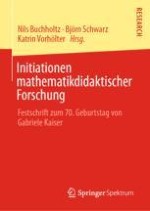2022 | OriginalPaper | Buchkapitel
7. Teachers’ Perception of and Reflection on Students’ Metacognitive Knowledge in Mathematical Modelling Processes
verfasst von : Lisa Wendt, Alexandra Krüger, Gloria Ann Stillman
Erschienen in: Initiationen mathematikdidaktischer Forschung
Verlag: Springer Fachmedien Wiesbaden
Aktivieren Sie unsere intelligente Suche, um passende Fachinhalte oder Patente zu finden.
Wählen Sie Textabschnitte aus um mit Künstlicher Intelligenz passenden Patente zu finden. powered by
Markieren Sie Textabschnitte, um KI-gestützt weitere passende Inhalte zu finden. powered by
